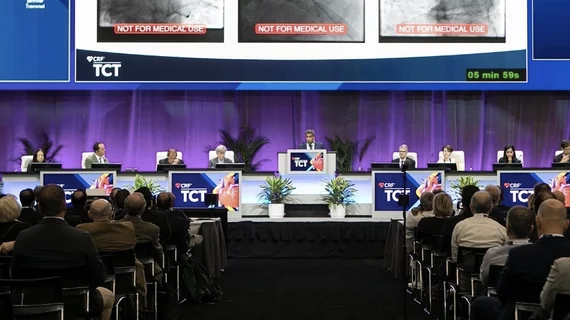The Cardiovascular Research Foundation (CRF) has announced the late-breaking clinical trials being presented at the Transcatheter Cardiovascular Therapeutics (TCT) 2023 annual meeting Oct. 23-26, 2023, in San Francisco. TCT features cutting-edge research in interventional cardiovascular medicine that directly impacts patient care and how physicians treat heart disease.
The sessions below include three late-breaking trials sessions that highlight the studies that are expected to have the most impact on interventional cardiology and structural heart interventions.
Late-Breaking Clinical Trials: Session I, in Collaboration with the New England Journal of Medicine
Tuesday, Oct. 24, 11 a.m. — 12:28 p.m., Innovation & Clinical Science Theater, Hall B, Exhibition Level, Moscone South
• PARTNER 3 Low-Risk: Five-year clinical and echocardiographic outcomes from the PARTNER 3 Low-Risk Randomized Trial. Presented by Martin Leon.
• EVOLUT Low Risk: Four-year outcomes from the EVOLUT Low Risk Trial. Presented by Michael Reardon.
• WATCH TAVR: Safety and efficacy of left atrial appendage (LAA) occlusion at the time of transcatheter aortic valve replacement. Presented by Samir Kapadia.
• ALIGN-AR: Initial outcomes of the JenaValve Trilogy transcatheter aortic valve replacement system in high-risk patients with symptomatic severe native aortic regurgitation. Presented by Vinod Thourani.
Late-Breaking Clinical Science: Session I, in Collaboration with the Journal of the American College of Cardiology
Tuesday, Oct. 24, 2-3:30 p.m., Innovation & Clinical Science Theater, Hall B, Exhibition Level, Moscone South
• PARTNER 3 Low-Risk: Five-year clinical and echocardiographic outcomes from the PARTNER 3 Low-Risk Randomized Trial. Presented by Rebecca Hahn.
• Tendyne SUMMIT Pivotal Trial: Roll-in and mitral annulus calcification (MAC) arm outcomes. Presenters are Jason Rogers and Vinod Thourani.
• TRILUMINATE Pivotal: Outcomes of Both Randomized and Single-arm Subjects with Transcatheter Tricuspid Valve Edge-to-Edge Repair for Tricuspid Regurgitation. Presented by David Adams.
• SWISS-APERO: One-year outcomes after Amulet or Watchman/FLX device for percutaneous left atrial appendage closure pre-specified analysis of the randomized clinical trial. Presented by Roberto Galea.
• EXPAND G4: One-year outcomes with fourth-generation mitral valve transcatheter edge-to-edge repair. Presented by Ralph Stephan von Bardeleben.
Late-Breaking Clinical Trials: Session II, in Collaboration with The Lancet
Wednesday, Oct. 25, 11 a.m. — 12:28 p.m., Innovation & Clinical Science Theater, Hall B, Exhibition Level, Moscone South
• LIFE-BTK: Primary outcomes of the Esprit BTK drug-eluting resorbable scaffold for the treatment of infrapopliteal lesions. Presented by Ramon Varcoe.
• AGENT IDE: Primary outcomes of a pivotal multicenter randomized trial comparing the AGENT paclitaxel-coated balloon with conventional balloon angioplasty for in-stent restenosis. Presented by Robert Yeh.
• T-PASS: Less than 1-month dual antiplatelet therapy followed by ticagrelor monotherapy after coronary drug-eluting stent implantation for acute coronary syndrome. Presented by Myeong-Ki Hong.
• PICSO-AMI-I: Pressure-controlled intermittent coronary sinus occlusion (PiCSO) in acute myocardial infarction. Presented by Giovanni Luigi De Maria.
Late-Breaking Clinical Science: Session II, in Collaboration with Circulation
Wednesday, Oct. 25, 2-3:30 p.m., Innovation & Clinical Science Theater, Hall B, Exhibition Level, Moscone South
• Sirolimus-coated balloon versus paclitaxel-coated balloon for the treatment of drug-eluting stent in-stent restenosis. Presented by ShaoLiang Chen.
• COMPARE 60/80 HBR Trial: The primary endpoint results from the randomized, controlled, multi-center trial comparing ultrathin with thin strut stents in high bleeding risk patients with an abbreviated DAPT duration. Presented by Pieter C. Smits.
• PARTHENOPE Trial: Polymer-free amphilimus-eluting stents vs. biodegradable-polymer everolimus-eluting stents in all-comers undergoing PCI 1-year results. Presented by Giovanni Esposito
• Biostemi Randomized Trial: Long-term outcomes with biodegradable Polymer Sirolimus-Eluting stents versus durable polymer everolimus-eluting stents in patients With ST-segment elevation myocardial infarction 5-year follow-up. Presented by Juan F. Iglesias.
• SWEDEHEART National Registry: Long-term clinical outcomes after iFR vs. FFR guided coronary revascularization. Presented by Matthias Götberg.
TCT Late-Breaking Clinical Trials: Session III, in Collaboration with the Journal of the American Medical Association
Thursday, Oct. 26, 11 a.m. — 12:30 p.m.
Innovation & Clinical Science Theater, Hall B, Exhibition Level, Moscone South
• TRISCEND II: A randomized trial of transcatheter tricuspid valve replacement in patients with severe tricuspid regurgitation. Presented by Susheel Kodali.
• TRILUMINATE: Quality of life after transcatheter tricuspid-valve repair vs. medical therapy in patients with severe tricuspid regurgitation. Presented by Suzanne Arnold.
• VIVA: Transcatheter versus surgical aortic valve replacement in patients with severe aortic stenosis and small aortic annuli. Presented by Josep Rodés-Cabau.
• CLASP IID Trial and Complex Anatomy Registry: One year outcomes from a randomized comparison of transcatheter edge-to-edge repair systems for degenerative mitral regurgitation. Presented by Robert Smith and Firas Zahr.
TCT Late-Breaking Clinical Science: Session III, in Collaboration with the European Heart Journal/EuroIntervention
Thursday, Oct. 26, 2-3:30 p.m., Innovation & Clinical Science Theater, Hall B, Exhibition Level, Moscone South
• RADIANCE Clinical Trial Program: Individual patient-data pooled analysis of endovascular ultrasound renal denervation or a sham procedure at 6 months. Presented by Ajay Kirtane.
• ISAR-DESIRE 3 Trial: Recurrent revascularization after teatment Of drug-eluting stent eestenosis with drug-coated balloon, plain balloon or drug-eluting stent 10-year results. Presented by Tobias Koch.
• DCB-ACS Trial: Drug-coated balloon for acute coronary syndromes, a multi-center randomized non-inferiority trial. Presented by Haibo Jia.
• EPS/TAVR Study: Atrioventricular conduction system changes during transcatheter aortic valve replacement (TAVR), anatomic and electrophysiologic predictors of heart block in prospective 400 patient study. Presented by Alfred Buxton.
• Outcomes of patients with new left bundle branch block following TAVR: Insights from the NCDR STS/ACC TVT Registry. Presented by Nickpreet Singh.
Find the complete listings of the late-breaking TCT 2023 trials.
Find the complete listings for the late-breaking clinical science sessions.

